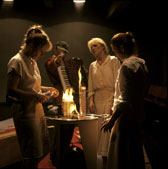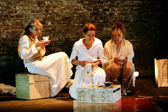



THE STORY OF TEA Performers: Jugoslav Hadžić, Aleksandra Jelić, Sanja Krsmanović Tasić, Maja Mitić Texts: Ruth Magraff, A. P. Chekhov “Three Sisters”, Kakuzo Okakura “The Book of Tea”, Matsuo Basho – three haiku poems, Dave Duggan “AH 6905”, documentary materials collected by Human Rights Fund and Women in Black, fragments from daily news, information from internet, DAH Theatre The duration of the play is 70 minutes. |
| ................................................................................. |
The new performance of DAH Theatre, The Story of Tea, takes as its starting point the classic play by A. P. Chekhov “Three Sisters”. The play serves as a reference point; the frame which holds different stories and topics together. The central theme of the play-the train that will eventually take the sisters to their dream place, Moscow, or the situation of missing opportunities and lost chances – inspired and provoked several important issues that DAH Theatre's version of “Three Sisters” is dealing with. Trains and missing opportunities lead to missing people, missing languages and missing truth. The question which the performance puts in focus is not about hidden triths but rather about how we treat harsh truth. What happens when for example the truth about the abduction of people in a train, during the wars in our region, is known and recognized, even on the level of the state, but until today victims have not been officially mourned and their families have never heard one word of condolence? What are the implications of the mass of information that we get today through media, information that is not properly or humanely treated. What is the role of memory? What are the forms of amnesia of our times and how to create the ritual of anamnesis? “The forgetting that the anamnesis seeks to undo is the forgetting that takes place whenever violence is justified.” “In the contemporary world, destruction and violence can only be opposed by the creation of sense” – the founding and continuing motto of DAH Theatre Jadranka Anđelić and Dijana Milošević formed DAH Theatre in 1991 out of the need for profound experimental work. In 1993 DAH Theatre enlarged its activities by forming the DAH Theatre Research Centre. This is not only a building of bricks but an ongoing program of workshops, lectures, seminars, guest performances and festivals. The work of the Centre is aimed toward a constant exchange of knowledge, experience and ideas amongst artists and participants from various theatrical and national traditions. To be an independent non-governmental group in this country, during the last years, has been a great challenge. Through their work, the members of DAH Theatre have strongly opposed war and violence. |
